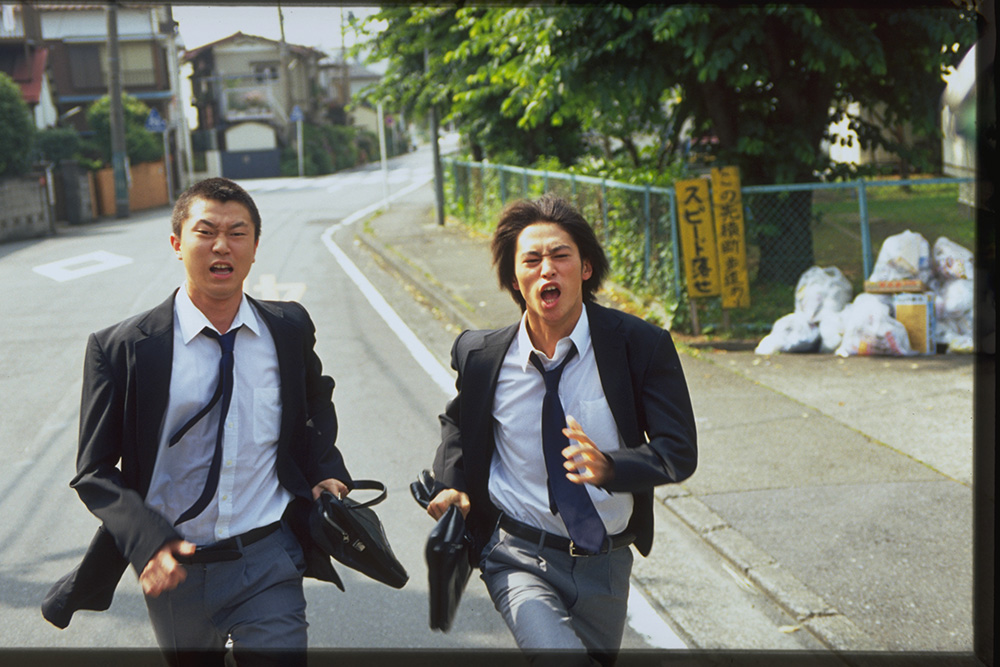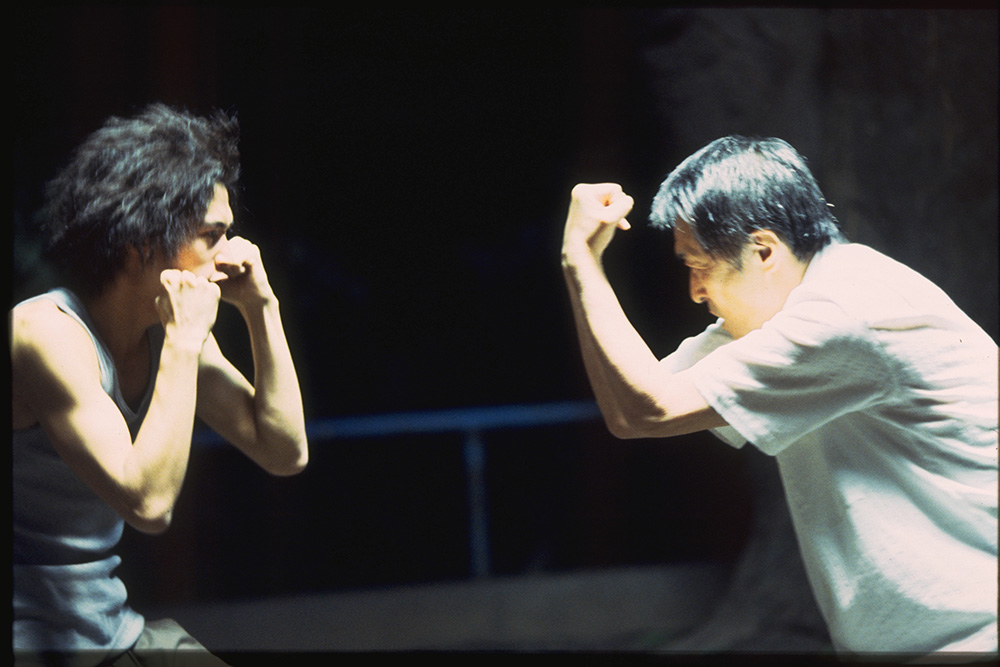
“A rose by any other name would smell as sweet.”
The adage above—from William Shakespeare’s play Romeo and Juliet—has stood the test of time, having been referenced in countless other books, television shows, and films. The assertion that the names of things do not affect what they really are is perhaps more relevant now than it was before, or at least equally relevant, especially when it comes to negative connotations (e.g. calling someone a derogatory word out of pure hate). One of the many films to reference this particular quote in order to drive their message home is Isao Yukisada’s Go (2001), which was released theatrically all the way back at the start of the 21st century.
Based on the award-winning novel by Kazuki Kaneshiro, Go (2001) tells the story of Sugihara (Yōsuke Kubozuka), a Japanese-born third-generation Korean teenager, who is struggling to find his place in a society that does not accept him. After moving from an all-Korean school to an all-Japanese one, Sugihara begins to experience incessant taunting from his peers, often resulting in physical altercations. He is dubbed a “zainichi”, which is a word used for a foreign citizen temporarily staying in Japan, paving the way for further alienation. Things seem to start looking up when he begins to fall for Sakurai (Kou Shibasaki), who suddenly begins to show interest in him. The possibility that she might accept him for who he is creates a shift in the course of his life.

One thing that sets this story apart from other more conventional coming-of-age tales is the fact that Sugihara has zero tolerance for his bullies and doesn’t let them get away with their nonsense. As it turns out, his father taught him how to box at a very young age, and he rarely hesitates to put his skills to use when he feels necessary. This is proven fairly early on when he begins to drop-kick a group of his tormentors during a basketball game after a foreseeable rivalry is established. While I personally don’t condone violence in real life, this characteristic made me root for Sugihara from the start, with hopes that he would have a fully fleshed-out arc where his angst would eventually find some solace.
Despite some of the mild on-screen violence, Sugihara (as our narrator) reassures us that this is in fact his love story. Whether he’s referring to self-love or romantic love isn’t immediately clear until perhaps the second act, where both types of love appear to be commensurably vital. Unequivocally, the film takes a slight (but not abrupt or unwelcome) tonal shift once Sakurai comes into the picture, leaving some of the cruelty depicted in the first act on the back burner while introducing a comparably familiar high school romance that scarcely avoids being too sappy or cheesy. In fact, I quite enjoyed the interactions between the two characters; Sakurai’s seemingly carefree spirit and spontaneity serving as a stark contrast to Sugihara’s more stoic and walls-up demeanor made for some very entertaining and heartwarming interactivity.

This is very much a film of its time in terms of production, with its archetypal late 90s/early 2000s score, quirky editing choices such as time-lapse used for comedic or transitional effect, and Yōsuke Kubozuka‘s enormous hair. With that said, the subject matter—identity, prejudice, love, and friendship, to name a few of the topics explored—stands the test of time just like the Shakespeare quote cited at the top of this review. I must commend both Isao Yukisada and Kazuki Kaneshiro for tackling the existing preconceptions surrounding Japanese identity and the mostly unspoken racism that “non-citizens” face.
While this probably isn’t the first Japanese film to explore these issues, it definitely does so in a very eloquent and effective way. I imagine that a handful of people aren’t even aware of this subject matter, so it would certainly be eye-opening for those who are not aware. Go (2001) is a competent coming-of-age drama with a pertinent message that shouldn’t go unheard. There are a number of pleasantly surprising cameos from veteran actors sprinkled throughout, too, so keep your eyes peeled for Yōji Tanaka, Yoshiyuki Morishita, Ren Osugi (if you know, you know), and Kanji Tsuda, just to name a few!
Go (2001) will be released on Blu-Ray & Digital for the first time through Third Window Films on May 22nd. You can read more information about this upcoming release here.

More from Third Window Films
“There is always some madness in love. But there is also always some reason in madness.” -Friedrich Nietzche Last year, cinema fans worldwide were able to engage and appreciate the… Confessions (Kokuhaku in Japan) is a 2010 revenge thriller based on Kanae Minato’s critically acclaimed debut novel. From director Tetsuya Nakashima who also produced the visually bubbly ‘Kamikaze Girls‘ and… Punk Samurai Slash Down is a 2018 Japanese period action/drama, written by Kankurô Kudô and directed by Gakuryû Ishii (formerly known as Sogo Ishii). The film is based on the… Japanese artistUjicha has been garnering a cult following, and even before watching this movie, I was aware of the name through buzz coming from the film fests. However, I had… Greetings to you from Straight Outta Kanto! What would you do, dear readers, if you found yourself in a situation where hordes of bare-breasted lust-filled women chased you through rural… If ever there was a personification of “It’s not the Destination, it’s the Journey”, it’s Seiji Tanaka’s 2018 Millennial thriller Melancholic. Released recently in dual format by the pioneeringThird Window…Tezuka’s Barbara (2019) Movie Review – A Nuanced Portrait of Decadence and Obsession
Film Spotlight: Confessions (Kokuhaku) [2010]
Punk Samurai Slash Down (2018) Film Review – Audacious Reimagining of Jidaigeki Cinema
Violence Voyager (2018) Film Review: A Unique Vision of Madness From UJICHA
Suffering of Ninko (2016) Film Review – Sexual Temptation and Horror
Film Review: Melancholic (2019) – Seiji Tanaka’s Millennial Thriller

Your typical ghoul next door; film enthusiast, horror fanatic, J-horror nerd, aspiring horror host, and all around geek. Will likely be found cuddling with their cat and reading an old smelly book, or stuffing their face with popcorn at the cinema!

![Film Spotlight: Confessions (Kokuhaku) [2010]](https://www.grimoireofhorror.com/wp-content/uploads/2020/12/confessions-header-365x180.jpg)



